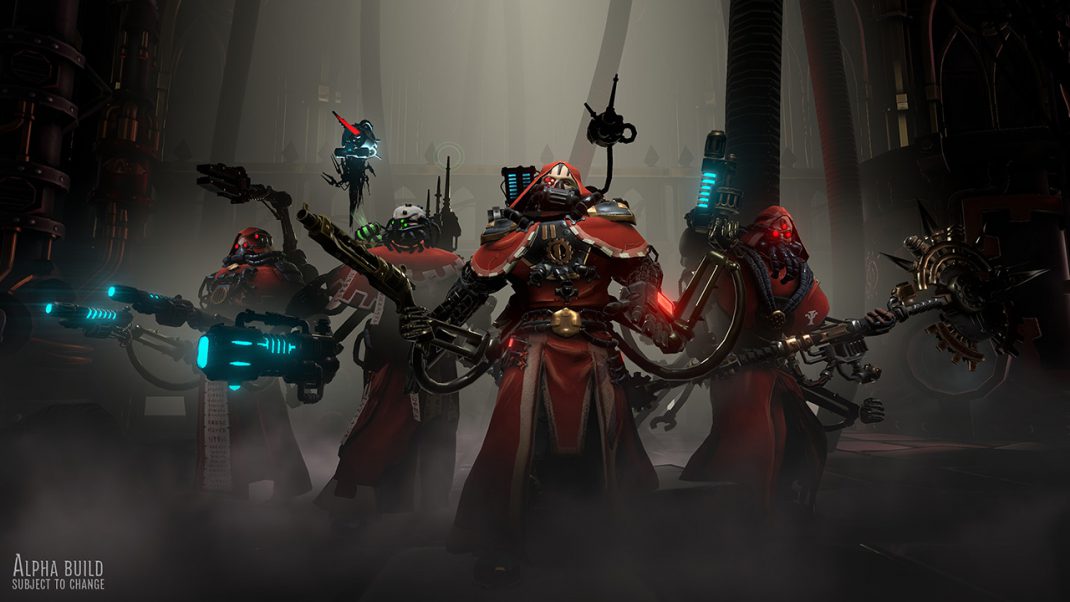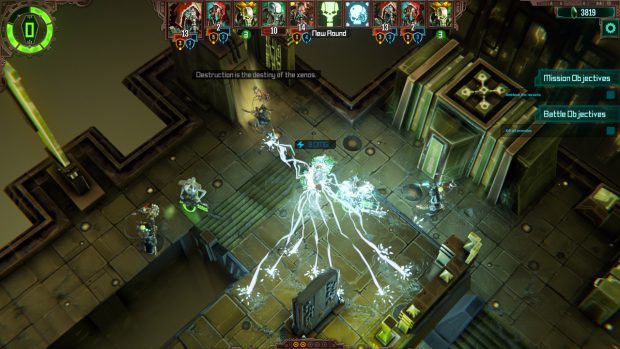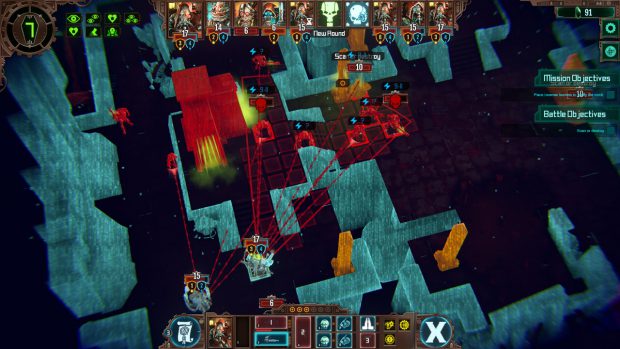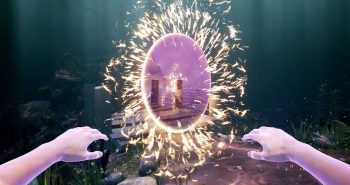With the release of the ninth edition of the tabletop game just around the corner, it is a great time to give another Warhammer 40k game a review. This time around, it is Warhammer 40,000: Mechanicus by Bulwark Studios. Games Workshop, the company that owns the rights to Warhammer 40k, has been much more open about letting their precious license out to different developers, which has led to some rather unflattering games of late. However, this game is not one of them. Warhammer 40,000: Mechanicus is a combination of the Warhammer 40k stories and myths with the game play of XCOM, and it works very well together.
“There is no truth in flesh, only betrayal.”
“There is no strength in flesh, only weakness.”
“There is no constancy in flesh, only decay.”
“There is no certainty in flesh but death.”
Story
Warhammer 40,000: Mechanicus follows the tech branch of the armies of the Emperor, known as the Adeptus Mechanicus. Adeptus Mechanicus, or the Cult of the Machine, provides the Emperor and the armies of Terra with scientists, technicisions, and engineers. The branch is organized like a religion that worships the Machine God or “Omnissiah”. This gives the entire branch a much more religious overtone then a military one, and that carries into Warhammer 40,000: Mechanicus.
The story of Warhammer 40,000: Mechanicus, which was written by Ben Counter (veteran of writing over forty 40k novels), focuses on the Adeptus Mechanicus exploring a world, only to discover the tech remnants of an alien race that came before. While exploring the tombs of this alien race, they find that the race hasn’t left, but is entombed within these structures and is waking up. This puts the Adeptus Mechanics in direct conflict with the Necrons, robotic skeletons that serve C’tan and have been dormant for over 60 million years.
Before each mission, the leaders of the Adeptus Mechanicus argue over the different approaches or meanings of what you are accomplishing on the surface. It’s these leaders that gives Warhammer 40,000: Mechanicus its feeling and tone. Your troops on the field never exhibits any type of personality, but these leaders each have a different personality with a different view of how to best serve the Omnissiah. Scaevola speaks in equations, not true sentences while Videx believes ignorance is strength and anything alien must be destroyed to preserve the faith. As missions continue, you will need to make decisions on what to do with certain interactions, based on the ideals of your leaders.
The story works and is faithful to the Warhammer 40k universe. If you are looking for a character arc, where a character gets to learn and grow and develop, you are in the wrong game. This story is full of gothic religious overtones and a crusade against the xenomorphs on the planet. The characters’ personalities are interesting and varied, but also never change nor has any type of story arc. Still, the story is faithful to the Warhammer 40k universe and you will get a very positive Warhammer story out of Warhammer 40,000: Mechanicus.
Gameplay
In my intro, I compared Warhammer 40,000: Mechanicus to XCOM, which is about the closest game that I have played that feels closest in comparison. Warhammer 40,000: Mechanicus is a turn based game that focuses on one squad of tech priests exploring tombs on the planet. You will select your next mission from a series of missions that can be found at the player hub, which is represented by your massive starship. In this hub, you will also get to outfit your tech-priests with different weapons and skills. Each weapon will have different characteristics, such as damage type, range and power, that you need to take into consideration before each mission. The skills are also broken into several skill-trees that gives different bonuses or advantages.
Once on a mission, your view will change to that of the map of the tomb that you are currently exploring. Each room will have a different icon denoting something that you can interact with, however, the longer you spend exploring a tomb the more Necrons will awaken and rise to stop you. Some rooms have the aforementioned decisions that you need to make, while others will have Necrons already awake within them that will lead to combat.
When you enter combat, your view will change to that of the room that you are fighting in. You will get to place your tech-priests down on the map, then combat begins. Combat is turn-based, and you will see this sequence along the top of your screen. Each individual will have a certain number of strategy points that can be used to interact with items, move or fight. You can gather more points at different nodes on the map. These points are shared amongst all of your characters and you will have a maximum that you are allowed to store.
Each weapon will do a different type of damage, and each enemy can be resistant to different types of damage, but you need to scan your enemies to see what they are resistant to or how many health points they have. Putting up your melee tech-priest against Necrons who are resistant to melee damage is not wise. You will need to use your Servo-Skulls to gather this information, and also to interact with other items on the map. Necrons will also continue to pour onto the map from their spawn points, and will also try to resurrect themselves once knocked down.
What differs Warhammer 40,000: Mechanicus from Xcom is the complete lack of cover and the percentage to hit. In Warhammer 40,000: Mechanicus you only have a percentage to crit, every attack will hit it’s target if you are in range. However, the same goes with the Necrons. Your resistances will help defend yourself, but it is better to utilize disposable troops, like your Servitors, to act as shields to protect your tech-priests.
Warhammer 40,000: Mechanicus plays incredibly well and, while it feels like XCOM in some ways, it differs itself enough from that franchise to be interesting within itself. Having the game focus on the often over-looked Adeptus Mechanicus gave the game play a different feeling then I was expecting, as the story also helped guide the tone of the game itself.
Aesthetics
While I would not say that Warhammer 40,000: Mechanicus fails to hit modern day levels of aesthetics, this is easily the section that it falls shorter then the rest. The graphics of Warhammer 40,000: Mechanicus work well for what it is intended. The player hub does a great job in helping push that gothic/religious feeling that the story is portraying, but the actual graphics of the game feels like they fall shorter then I would like. Tombs are generic in design, aesthetically, and dialogue boxes are just talking heads that are not fully animated.
Voice acting is also absent in this game during game play. Each leader communicates via textbox, with no voice acting at all. This is a shame, since it would have brought the personalities of the tech-priests to whole different level. While not a deal breaker in any sense of the term, I feel that voice acting would have made Warhammer 40,000: Mechanicus much better in terms of story telling and interactions with the player.
Final Thoughts
Warhammer 40,000: Mechanicus is a great representation of the Warhammer 40k universe and is a great game in it’s own right. Warhammer 40,000: Mechanicus delivers on the gothic/religious overtones of the Adeptus Mechanicus as they begin their crusade against the xeno Necrons. The game play will feel like an XCOM game, but won’t feel as punishing or as difficult. In fact, I was expecting a difficult slog through Warhammer 40,000: Mechanicus and what I found was a game that could be challenging at times, but wasn’t overpowering in its difficulty. As a 40k fan, I thoroughly enjoyed Warhammer 40,000: Mechanicus and feel that fans of the game will enjoy this as well. For non-fans of Warhammer 40k, Warhammer 40,000: Mechanicus may not be the perfect entry point into the massive lore that is Warhammer 40k, but should be the second or third game you play to get into what the universe is all about. Warhammer 40,000: Mechanicus is available now on the Playstation 4.







